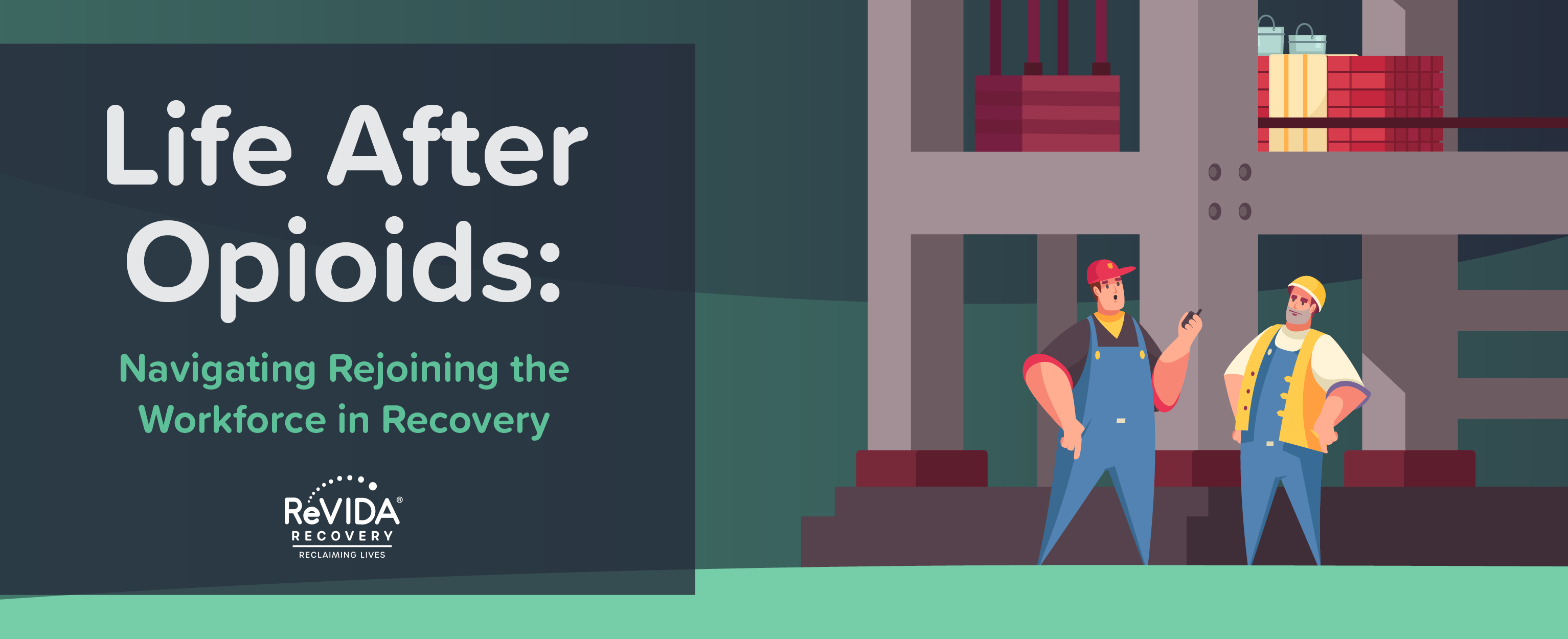Table of Contents
Life After Opioids: Navigating Rejoining the Workforce in Recovery
Opioid use disorder takes over millions of lives every year. Making the choice to seek treatment can be empowering, and reclaiming your life from opioids will feel rewarding and freeing. But opioids have been the center of your world for the past months or even years – how can you go about trying to find your new normal? Where are you going to work? What if you have a criminal record now? Where do you begin?
ReVIDA® Recovery has been helping many throughout the Eastern Tennessee and Southwest Virginian areas find recovery from opioid use disorders. In this article, we are discussing how to get back into the workforce during recovery, and where you can find resources to get your life back on track.
Entering a Medication-Assisted Treatment Program – What to Expect
One of the first stages of finding recovery from opioid use disorder is seeking treatment. Medication-assisted treatment (MAT) along with therapies and skill-building classes are the basis of treatment and where recovery begins. Opioid use disorder is a mental health condition and oftentimes coincides with conditions such as depression and anxiety. Treatment programs for opioid use disorder can address these conditions and provide proper medical and emotional care. This can help you discover where your opioid use disorder stemmed from and how to cope moving forward.
Treatment for opioid use disorder does not have a specific timeline. Many MAT programs last as long as the patient needs, which can vary between months, years, and even a lifetime. It is important to attend support groups and therapies regularly, especially early in recovery. This increases the chances of success and prevents the risk of return to use. Life stresses can always pop up at the most inconvenient times, and having support to turn to is key.
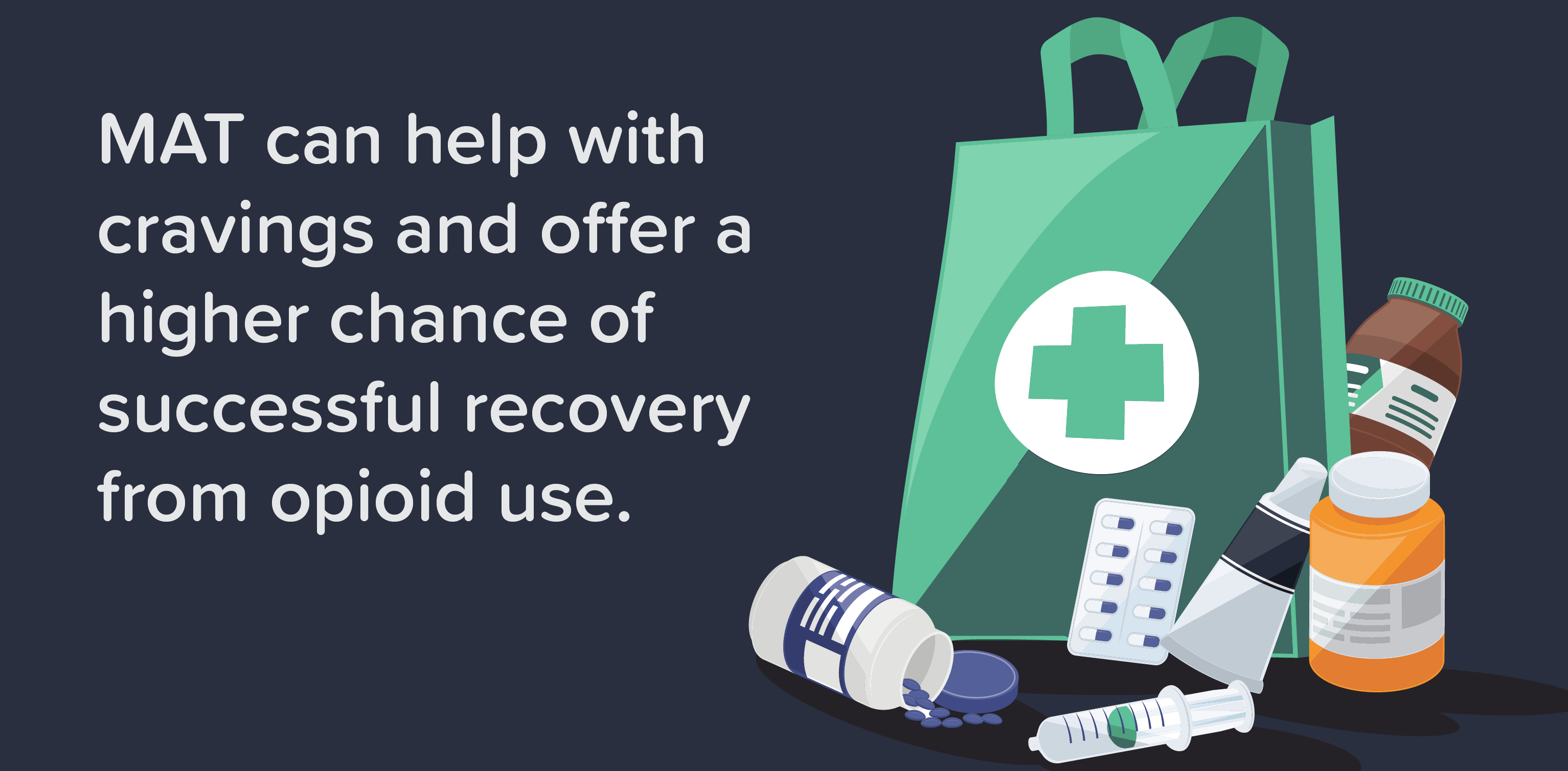
MAT can help with cravings and offer a higher chance of successful recovery from opioid use, as well. Medications like Suboxone have been proven to aid in the success of recovery from opioid use disorders, and we at ReVIDA® Recovery have seen it firsthand. Our program utilizes Suboxone treatment in Johnson City in coordination with therapies and support groups, and you can expect to be surrounded by peers and staff who will treat you with respect and compassion.
Working With a Substance Use Care Coordinator
When you enter a treatment program, you may have areas of concern outside of the treatment process. Obtaining food, housing, clothing, and transportation can increase your stress of finding recovery. A substance use care coordinator helps in these areas and connects you with resources to meet your needs outside the recovery space. Britany Lawson, RN, is a substance use care coordinator here at ReVIDAⓇ Recovery. She describes her role in the treatment process:
“When a patient comes in, we ask them if they need any resources – if they have issues with housing, food, clothing, or any necessity outside of the recovery facility that they may need help with. This includes finances, gas, and transportation as that is a big issue. We ask them all these questions because we want to help them outside of treatment. We know that these can be triggers for them to use as they can be stressors for them. If there is a need we get them in touch with the proper contacts that we have within the community including jobs, financial planning, or social services.”
Integrating Into the Workforce: Where Do I Start?
It can be difficult to find work after living with an opioid use disorder. There may be a gap in your work history or jobs that will not provide a good reference. Or you may have a felony on your record preventing you from seeking employment. No matter the case, there are companies that work with felons and those in recovery.
Resources for Felons and Employment Seekers in Tennessee
Fast food restaurants are a good place to start when first re-entering the workforce. Many hire felons and offer flexible scheduling which makes it easier to keep up with appointments. Some factories such as Amazon also hire felons and often offer ideal benefit packages. It is always best to disclose the felony during the hiring process – being upfront about it with the employer shows honesty.
There is also the option of learning a trade skill. Tennessee College of Applied Technology (TCAT) located in Knoxville has programs for automotive, industrial electric, nursing, welding, and more. TCAT has financial aid options available and programs range in length. The average is 16 months and you will graduate with a certificate and be ready for a new career path.
ReVIDAⓇ Recovery is partnered with Tennessee Career Centers to help connect patients to local jobs. They offer resource rooms with access to phones, computers, and fax machines to help prospective employees get connected to job skills and possible employers. With locations throughout Tennessee, they have created ease of access to apply for jobs.
Resources for Felons and Employment Seekers in Virginia
One of the biggest requirements for obtaining employment is having a resume. The Virginia Employment Commission provides services for resume-building as well as connections to community employers. Having a resume can often be the deciding factor in getting an interview and a job.
Ms. Lawson, RN, spoke about other ReVIDAⓇ Recovery partners that aid in securing a job:

“Mountain Empire Community College is one of our career partners. They specifically have masonry classes and construction classes, and they provide meals and gas tickets to get to the school. They provide all the tools needed for the classes and the program is 8 weeks. They [patients] can get certificates and start jobs. Another partner we work with is the Southwest Virginia Workforce Development Board. The R.O.P.E.S. program specifically helps those in recovery find jobs, get their driver’s license reinstated, and pay for legal fees impending to get their license back.”
ReVIDAⓇ Recovery also partners with Luttrell Staffing, a local temp agency. Patients with not as many job skills can get employment on a temporary basis, and once they prove their skills, they can be asked to join the company. This helps those who don’t know for certain what they can do find work that suits them.
Preparing for an Interview
The next step in the hiring process is often an interview, where you will meet your potential employer and go over job specifics. The general rule of thumb is to dress professionally for an interview. This would mean khakis or dress pants and a button-down shirt or polo for males. Dress shoes should also be worn. For females, skirts or dresses that fall somewhere between their knees and ankles paired with a blouse or sweater with dress shoes are common. Clothes should be neat and tidy, you are trying to impress the employer, and the way you present yourself is important.
Be prepared to ask questions and be asked about yourself. Common interview questions include:
- Tell me about yourself
- Where have you worked previously
- Where do you see yourself in 5 years
- Describe a past work experience that is relevant to this position
- Why do you want to work here
These are common interview questions and knowing how you want to answer shows poise and professionalism. For example, answering you don’t know where you will be in 5 years shows a lack of direction. Instead, share your goals to possibly move up in the company. This shows dedication and that you want to be there for the long haul. Do your research about the company before the interview and have questions ready. Don’t be afraid to ask specifics about the role and the vision of the company. Again, this shows interest and dedication.
Always ask when the company plans to make its decision. If they say in a week, follow up with them after that time has passed if you haven’t heard anything. This shows that you are still interested in the role and shows your commitment. Make sure you include expressing thanks for the opportunity in the email and re-expressing your interest in the job. Don’t get discouraged if you don’t get the first job, there are many opportunities available in today’s job market. Keep your head up and keep trying. Many people may go through ten or more job interviews before landing a job offer.
You Got a Job Offer, Now What?
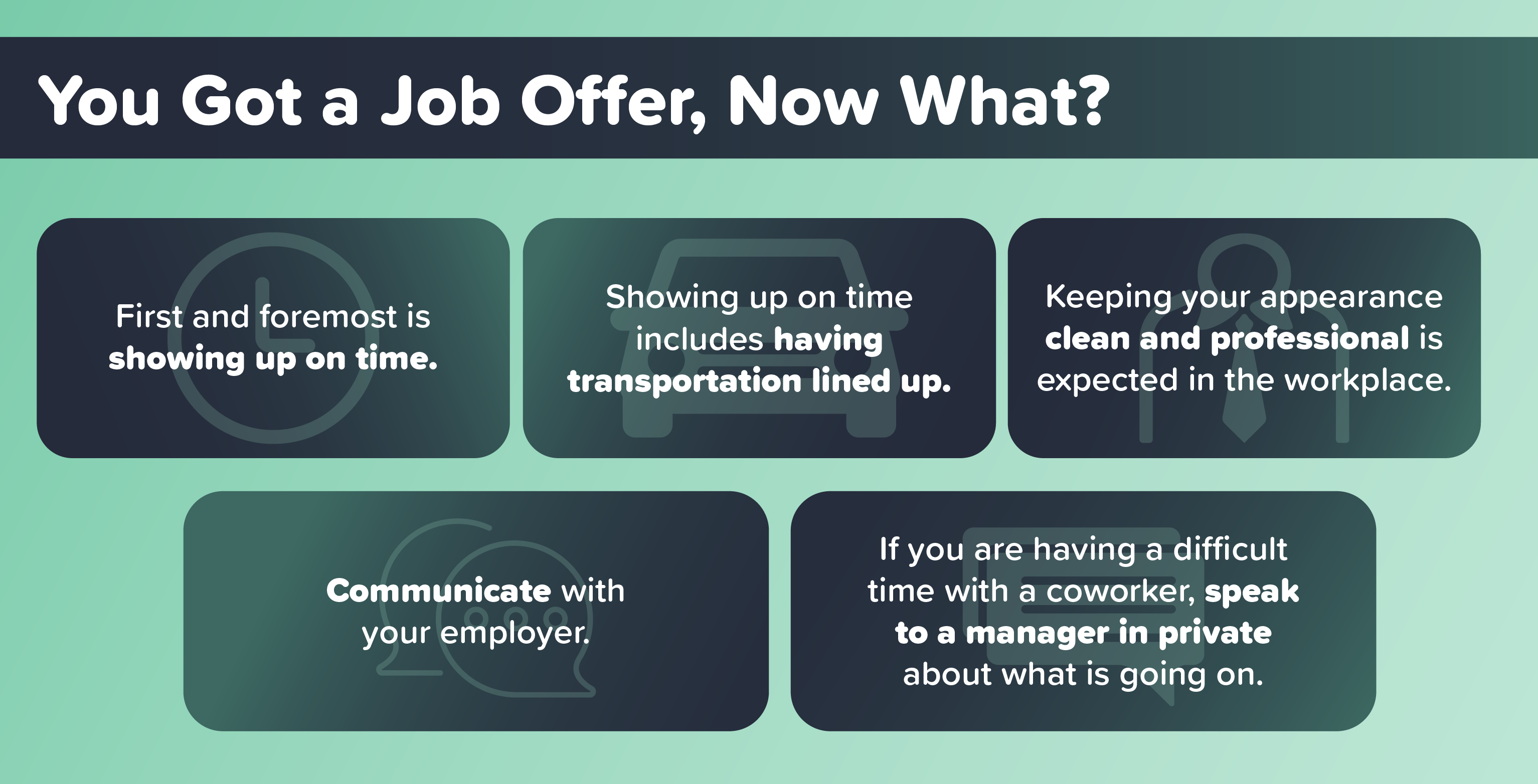
Accepting a new position is exciting and can encourage feelings of independence. There are basic rules to follow in order to keep the job and perform well. Here are some general guidelines for job etiquette:
- First and foremost is showing up on time. If the job starts at 9:00 a.m., arrive 15 minutes early. This gives you time to get in the building, put your stuff in a locker or storage, clock in, and be briefed for the day. While some places do have rules about how early you can clock in, it is always best to give yourself room for outside interference, such as traffic.
- Showing up on time includes having transportation lined up. If you do not have a reliable source to get to and from work, it will be more difficult to keep the job. Look at bus routes, apply places friends work at or are close to so you can ride share, or look at jobs within walking/biking distance. Getting to work on time is a must, and already knowing how you will get there will ease stress.
- Keeping your appearance clean and professional is expected in the workplace. If you have a dress code or uniform requirements, follow the policies in place and keep your clothes clean and neat. When you are working for a company, you become the face of your employer. Employers want people who look the part of a professional.
- Communicate with your employer. You may need to take time off for an appointment or family vacation. Giving appropriate notice for these scenarios is expected so the employer can cover your shift. While emergencies do happen, it is best to give at least a month’s notice for an expected absence. Communication is key and should be done with respect when talking with coworkers and those in higher-up positions.
- If you are having a difficult time with a coworker, speak to a manager in private about what is going on. Not everyone who works together gets along, and learning how to handle certain personalities can be challenging at first. Always use a respectful tone, you do not want to come across as attacking or defensive. Managers and human resource staff are trained in handling situations between coworkers, and they will be able to help resolve the issue.
Taking Suboxone and Working – What Are My Rights?
You do not have to disclose to an employer that you are taking Suboxone. However, some employers drug-test potential employees as part of the hiring process. Though Suboxone does not always show a positive result, there is a possibility. Adrian Thacker, FNP-C is the site medical director at ReVIDAⓇ Recovery in Duffield, VA. He shared his thoughts on pre-employment drug screens:
“With employment screenings, there is typically a separation between the employer and the testing company, particularly if the test is done outside the facility. A lot of the information surrounding prescriptions is communicated with the testing company and their medical review officer. They will see the result possibly testing positive for buprenorphine (and possibly naloxone) and then they will call and ask if they are prescribed that medication. At that point, the person just has to tell them the pharmacy they get the prescription from and they will confirm that with the pharmacy.
I have not had an issue with one of my patients being prescribed buprenorphine and not being able to get a job because of that. Employers will sometimes request a letter or our patients like to have one from us explaining the patient being in recovery, when they started, the goals they have achieved, and most importantly we put in the letters when applicable that patients taking buprenorphine do not experience sedation or intoxication taking this medication. We have many patients taking buprenorphine who have a driver’s license and are fully capable of driving. These letters are our form of advocating for our patients and we care very much about them.”
According to the Americans with Disabilities Act, opioid use disorder is classified as a disability. This protects you from discrimination from employers for taking Suboxone. Legally, a company cannot deny you employment solely based on medication-assisted treatment, and they also cannot terminate you for the same reason. However, it does not protect against those who are currently taking illegal opioids. This includes if you are taking Suboxone without a prescription. Employers do have the right to ask for proof of your prescription, and being cooperative shows you have nothing to hide.
Partners in the Community: How ReVIDA® Recovery Offers Support
Opioid use disorder doesn’t end when treatment is complete, it is a lifelong condition that requires support and therapy. MAT does not have a time limit either, some will take medication for a few months or years while others may take it for the rest of their lives. ReVIDA® Recovery is a leading provider of MAT as well as outpatient therapies. We do not turn anyone away, even if they experience a return to use. Our doors are always open and we will work with you and adjust your treatment as needed to prevent further returns to use.
ReVIDAⓇ Recovery offers both individual and group therapies each week. Mr. Thacker, FNP-C, shares about the program:
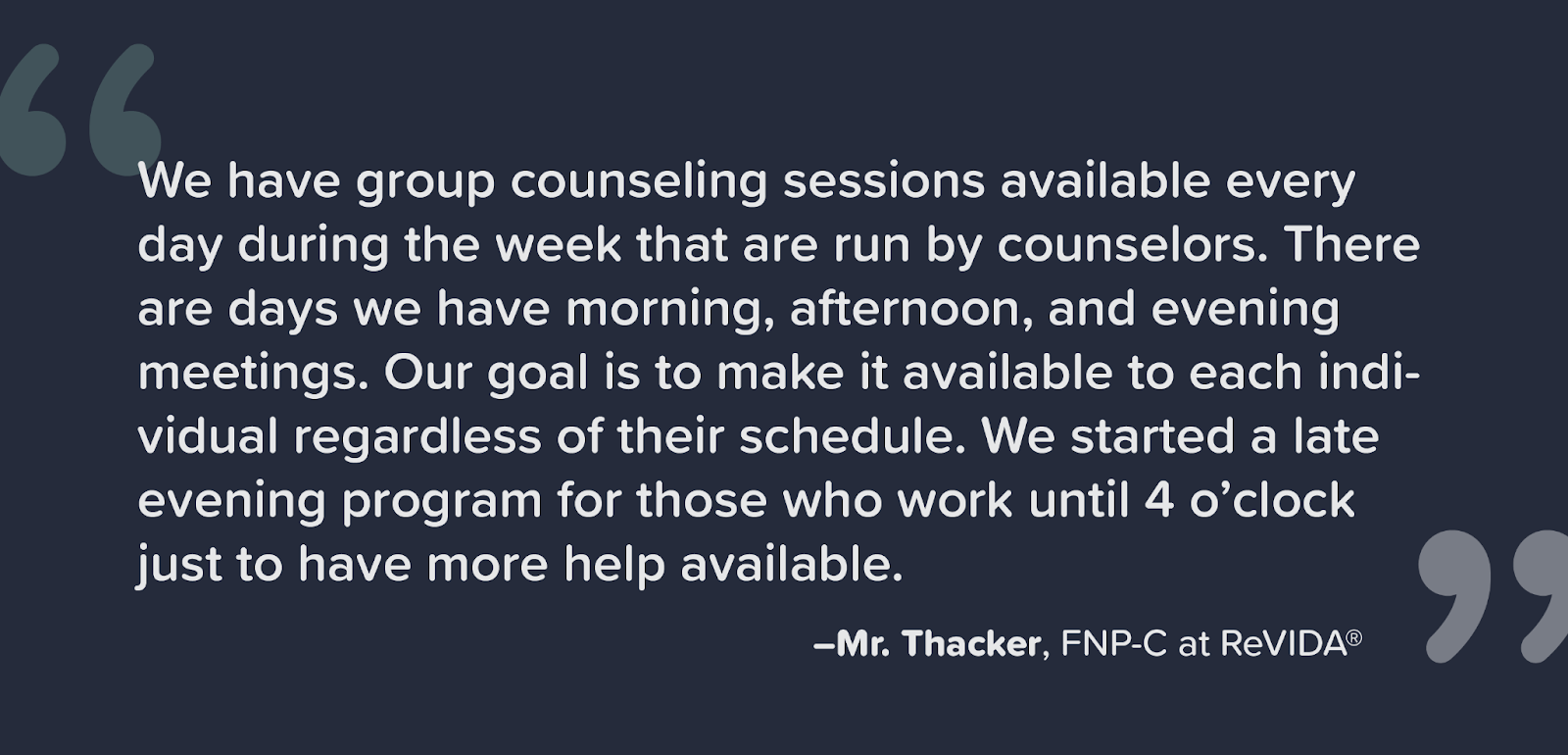
“We have group counseling sessions available every day during the week that are run by counselors. There are days we have morning, afternoon, and evening meetings. Our goal is to make it available to each individual regardless of their schedule. We started a late evening program for those who work until 4 o’clock just to have more help available.”
ReVIDAⓇ Recovery Partners in Appalachia
We are proud partners within the Appalachian communities, which helps us offer resources to our patients. Some of our partners include East Tennessee State University, UT Extension, the Sexual Assault Center of East Tennessee, the Virginia Employment Commission, the Virginia Department of Health, and many more. This allows us to help our patients connect with counseling, education, healthcare, and resources for recovery. Building these connections ensures you will have access to the care you need.
Additional Support Groups
Support groups are a crucial part of recovery, but not all of them are supportive of MAT. SMART Recovery is a program that approves of MAT and is evidence-informed. It is different from traditional 12-step programming and is backed by empowering the person. They host meetings in person and virtually throughout Tennessee and Virginia and are a good option for those looking for additional support. The Substance Abuse and Mental Health Services Administration also has a list of national organizations for support groups, including specific groups for different races, sexualities, and ages.
Getting Help and Support for Opioid Use Disorder in Appalachia
Living with an opioid use disorder can turn life upside-down, and navigating what comes next can be overwhelming. Choosing ReVIDA® Recovery gives you access to many resources in the community, including finding employment and counseling. Our dedicated team empowers you to relearn the skills and passions you had that opioids took away. Your future is bright, and you are capable of accomplishing great things.
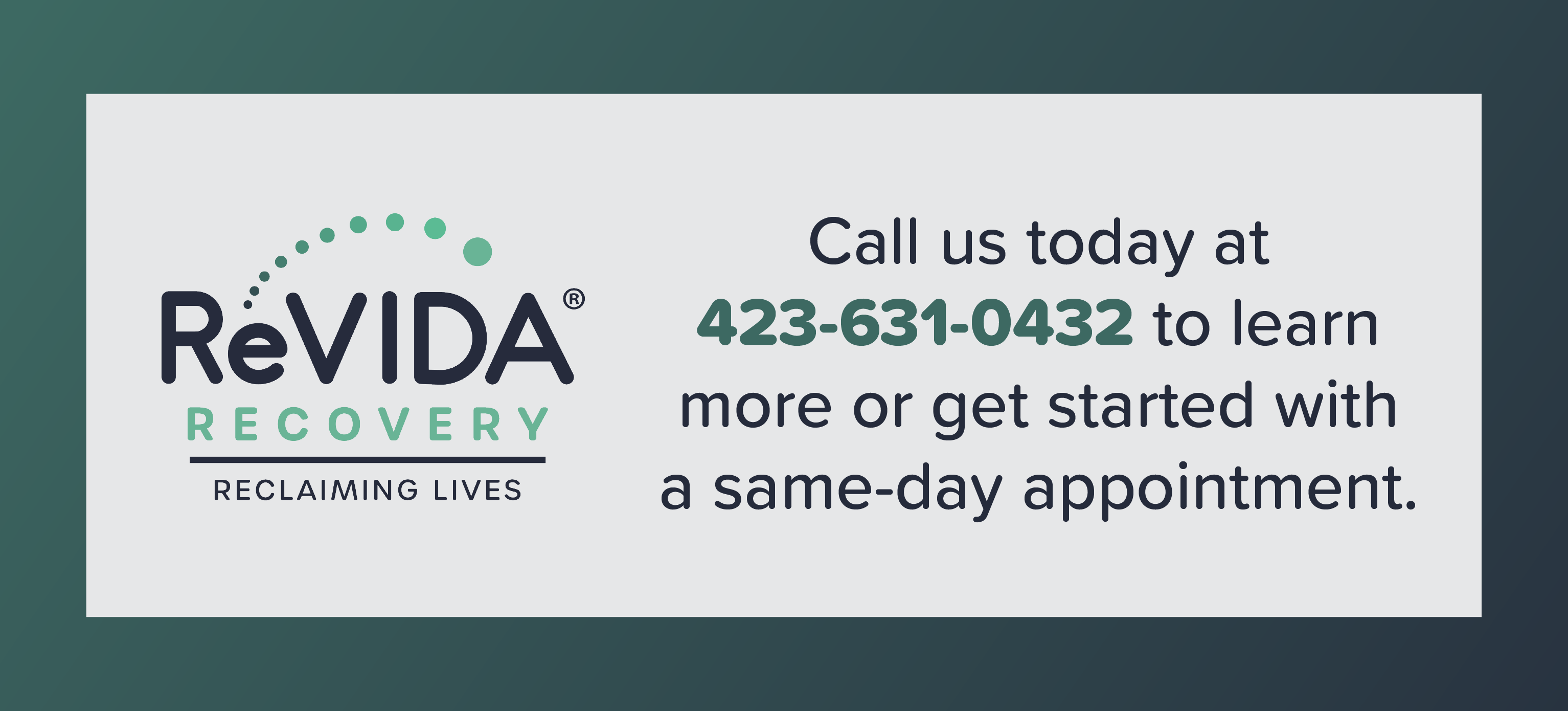
If you or someone you love is managing an opioid use disorder, help is available in Tennessee and Virginia. ReVIDA® Recovery is here and offers convenient MAT programming along with outpatient therapy. Call us today at 423-631-0432 to learn more or get started with a same-day appointment.
Reclaim your life.


